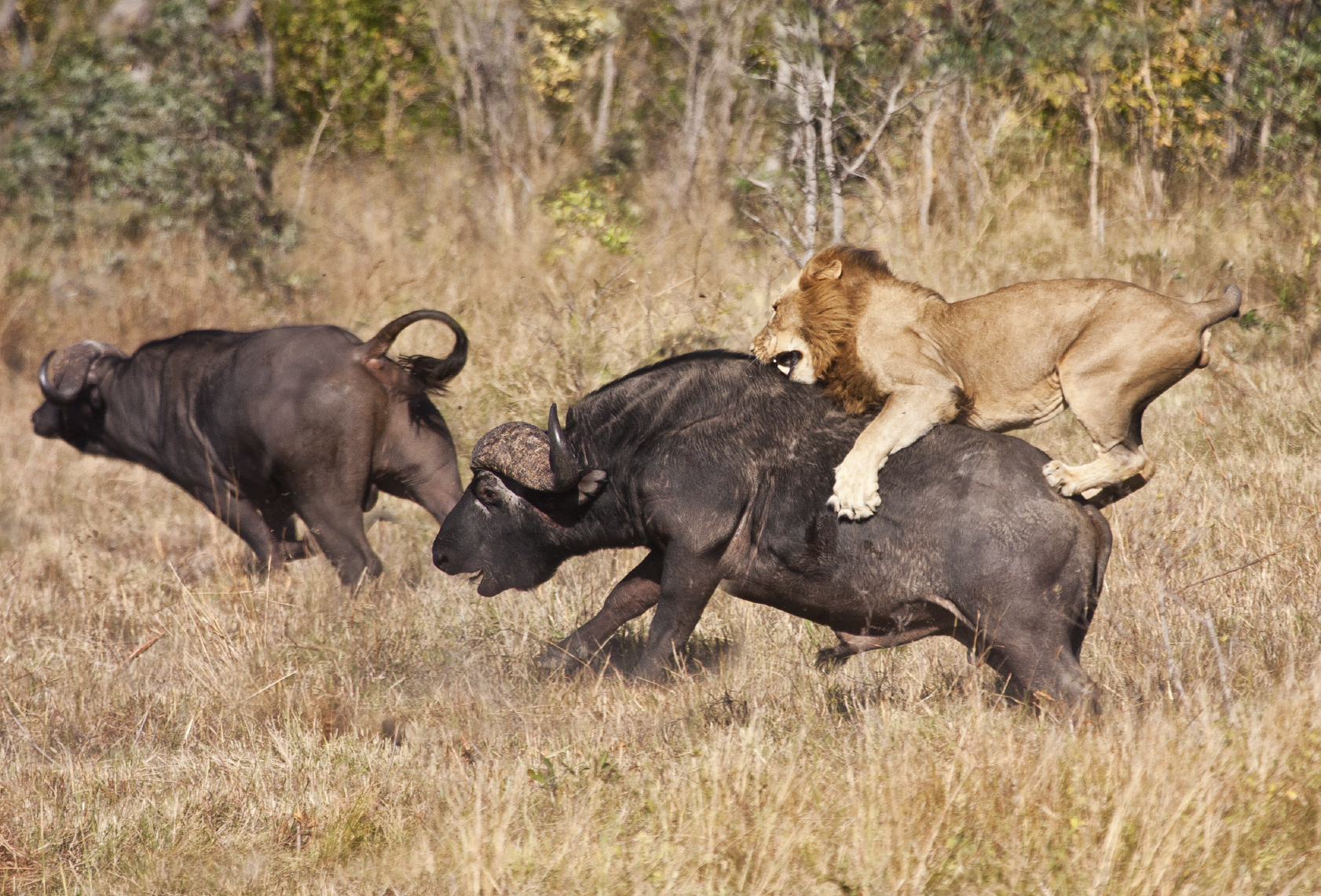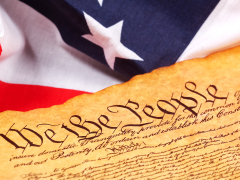It is natural for humans to possess external things in nature, says Aquinas.
This is the continuation of my discussion of Aquinas on private property rights. ST II-II, 66, 1 (Summa Theologiæ, Part II of Part II, Question 66). The discussion in sequence: The Full Text; Prologue / Beginning, Article 1, Objection 1, Objection 2, Objection 3, Aquinas’s Answer, Part I (this post), Aquinas’s Answer, Part II. Aquinas, Aristotle and the Naturalness of Sustenance, Reply to Objections
On the contrary, It is written (Ps. 8:8): “Thou hast subjected all things under his feet.”
“I answer that, External things can be considered in two ways. First, as regards their nature, and this is not subject to the power of man, but only to the power of God Whose mere will all things obey. Secondly, as regards their use, and in this way, man has a natural dominion over external things, because, by his reason and will, he is able to use them for his own profit, as they were made on his account: for the imperfect is always for the sake of the perfect, as stated above (Question 64, Article 1). It is by this argument that the Philosopher [Aristotle] proves (Polit. i, 3) that the possession of external things is natural to man. Moreover, this natural dominion of man over other creatures, which is competent to man in respect of his reason wherein God’s image resides, is shown forth in man’s creation (Gn.1:26) by the words: “Let us make man to our image and likeness: and let him have dominion over the fishes of the sea,” etc.
My commentary
Aquinas now puts forward his own view, namely, that it is natural for man to possess external things. His first point is that Psalm 8:8 (or 8:5-7 depending on your Psalter) contradicts the prior views represented in the objections and suggests that everything is “under the feet” of humans and thus subject to human control. The first part of the verse that Aquinas doesn’t quote is even more pertinent in some ways. Here is the King James translation:
5 For thou hast made him a little lower than the angels, and hast crowned him with glory and honour.
6 Thou madest him to have dominion (תַּמְשִׁילֵהוּ, בְּמַעֲשֵׂי יָדֶיךָ) over the works of thy hands; thou hast put all things under his feet:
The word translated as “dominion” here in Psalm 8 actually comes from a different Hebrew stem than the stem translated as “dominion” (RDH) in Genesis (1.26-28).
Note: Psalm 8 uses the stem (MšL [משׁל] and Genesis uses a term from the stem (RDH). MšL is used more frequently in the Hebrew Scriptures than RDH to describe how a King rules over his kingdom, and is used to describe both human kingly rule as well as divine rule.[1]The term MšL is used much more frequently in the Hebrew Scriptures. Examples where it is used to describe God’s rule are found in Ps. 103.19, Is. 103.19, to describes human rule such as Joseph … Continue readingThus linguistically speaking, Psalm 8 doesn’t illuminate the meaning of Genesis 1.26-28.
But in spite of the linguistic differences, Psalm 8 makes conceptually clear that God intends for humans to rule over the work of God’s hands. Perhaps, Psalm 8 was even intended to be an interpretation of Genesis 1, explaining what the term RDH means, and that seems how Aquinas takes it as well.
Conflict Between Two Psalms?
In any case, Psalm 8 seems to be in conflict with Psalm 23:1 (or 24:1 in some Psalters) which was cited in Aquinas’s objection 1 as evidence that “The earth is the Lord’s…” We thus have two verses of Scripture, both from Psalms, both of which refer to creation, and which seem to take different positions about nature’s relationship to God and human beings. Aquinas needs to explain how both verses can be true and not contradictory since both are understood as the inspired words of King David: Humans don’t have power over the nature of external things because they can’t change the substance or nature of things. This is a form of dominion that only God has, and it is this version of dominion to which Ps. 23 (or Psalm 24) is referring.
There is a second kind of dominion and this is “use” or “control” over external things. This is the kind of dominion that humans have and is referred to by Psalm 8, which says that everything is under human feet. Thus the contradiction in Scripture is only apparent, and not real. Both Psalms are true. God has dominion and humans have dominion, but of different sorts.
Aquinas thus enables us to understand the precise meaning of Genesis 1.26-28, when God tells the human creature to have dominion over the other creatures and over all the earth. What is intended is human dominion, not divine dominion. Here again is Gen. 1.262-8 from the King James version.
1.26 And God said, Let us make man in our image, after our likeness: and let them have dominion over the fish of the sea, and over the fowl of the air, and over the cattle, and over all the earth, and over every creeping thing that creepeth upon the earth.
1.27 So God created man in his own image, in the image of God created he him; male and female created he them.
1.28 And God blessed them, and God said unto them, Be fruitful, and multiply, and replenish the earth, and subdue it: and have dominion over the fish of the sea, and over the fowl of the air, and over every living thing that moveth upon the earth.
In Aquinas’s understanding, Genesis means that humans have a certain kind of dominion over creatures and external things, though humans don’t have the capability to change the nature of those things the way God does.
In making this distinction between two types of dominion (substantive versus control), Aquinas has neutralized the third objection above which was attributed to St. Ambrose. Aquinas understood Ambrose to be saying that “dominion denotes power” over things and since humans don’t have that kind of power, they can’t have dominion. Aquinas has now answered that objection. Yes, dominion can denote power over the nature of things, but that is not what it means here in Genesis. God has power over the nature of things. Humans have dominion of a different sort. But as we shall now see the sort of dominion that humans had at creation is not at all what we might have expected.
Dominion in Paradise and After
If you read Aquinas’s statements about human dominion over creatures only in the present discussion of theft and property (ST 2a2ae. 66, I), you would be left with the impression that Aquinas is talking about very typical human ways of using animals. You probably would think that God authorized humans at creation to possess animals for labor (e.g. plowing), clothing (e.g. wool and leather) and food. In other words, one would assume that at creation one can use and kill creatures for human purposes. But if fact Aquinas says that the first couple didn’t need animals for any of those purposes in Paradise. On the contrary, in Paradise, humans did not need animals for food, clothing or labor:
In the state of innocence men would not have needed animals to supply their bodily wants; either for clothing, because they were naked and not ashamed, being beset by no movement of irregular desire; or for food, because they used to feed on the trees of Paradise; or for transport, because they were too robust for that. But what they needed them for was to acquire an experiential knowledge of their natures. This is suggested by God leading the animals to Adam for him to give them their names, which designate their natures. (ST Ia. 96, I, ad. 3) (Note: Aquinas is referencing Genesis 2.19)
In what sense then did humans have or need dominion over creatures in the state of innocence? Aquinas says that animals would obey human commands. He writes, “As we have seen (95, I), things that ought to be subject to man started disobeying him as a punishment on him for his own disobedience to God. And so in the state of innocence before this first disobedience nothing that should naturally be subject to him withstood him.” (ST Ia., 96, I).
There are a number of interesting and important questions that arise from Aquinas’s position that dominion in the state of innocence is different from dominion after human disobedience.
First, the human relationship with creatures and nature is not defined once and for all but changes as a result of human disobedience and sin. Thus when Aquinas says something is “natural,” it is worth asking whether he means “originally natural” or “natural after the Fall?” Are both stages “natural” or is one natural and the other unnatural? This is a very interesting question for it raises the question of whether “natural” in Aquinas has a temporal dimension and a series of stages or whether what is natural is only what is at creation, but what occurs after disobedience is “unnatural” in some fundamental way. For example, Aquinas suggests elsewhere that death is not natural because it did not exist until after the first couple’s sin. He thus concludes that “death is not natural to man” and thus treats what was true at creation (the lack of death) as what is natural (ST IIa-IIæ, 164). We will have to bear this question of “natural temporality” in mind when we turn to Aquinas’s understanding of Aristotle and the philosopher’s notion of what’s natural. For Aristotle did not have this distinction between nature in the state of innocence and nature after sin and thus when Aquinas appeals to Aristotle’s notion of the natural, we need to consider how he maps it to his own.
Second, the realization that Aquinas’s conception of dominion at Creation did not include needing creatures for food, clothing or labor makes it more difficult to understand his affirmation in our present context that “it is natural for man to have possession of external things.” And he also says “Secondly, as regards their use, and in this way, man has a natural dominion over external things, because, by his reason and will, he is able to use them for his own profit, as they were made on his account: “ Here Aquinas is talking about human beings “using” external things and thus must clearly be talking about possession after the Fall, which makes sense since this appears in a section on Theft and Robbery.
In what sense, then, is possession and use natural and at what point in time is it natural? In Paradise, the human being doesn’t seem to need possessions at all since there is no need for food, clothing or labor. While Aquinas asserts humans have dominion in Paradise, and links that insight to the verses in Genesis 1.26-28, it is not at all clear how he discovers that “possession” of external things is natural too and also linked to Genesis 1.26-28. Is it that humans also have rights to possession at creation but didn’t need to exercise the right because they didn’t need to possess things, since they had no need of food or clothing? If so, why did God give them a right that they didn’t originally need? Or is the naturalness of possession and use something that they needed only after disobedience, when they had to labor for food and became aware and embarrassed by their nakedness? If so, did the naturalness of use and possession arise as a result of the Fall or was it always implicit in creation? Aquinas doesn’t answer this question explicitly, as far as I can tell and I shall return to it.
One can sense here that Aquinas is trying to bring together two different views of what’s natural. On the one side, is the view that use and possession of external things is natural. After all humans today still rely on creatures for food, clothing and labor. If possession were natural we would expect it arguably to be part of creation, since creation seems to authorize what is natural. On the other side is the view that the present state of human nature arose from disobedience in Paradise. It was only after sin that humans had a need to labor for food, to cover themselves with clothing, and eventually to eat animals. Aquinas reconciles those positions by making dominion natural and implying that it included possession, even though humans had no need of possessions at all. This will enable him to map the Christian view of the Fall together with Aristotle’s views that use of external things is natural.
Going forward, then, we should be sensitive to the use of the word “natural” in Aquinas, for naturalness may have a certain temporality about it that can allude to the state at creation or the situation post Paradise. We shall want to sort this out. Normally, we think of what’s natural as embedded in human nature and the natural world. And that meaning can map over to Aquinas as well, though one must bear in mind that human nature changed after sin and disobedience.
Why Do Humans Have Dominion?
Aquinas now shifts his attention away from the definition and meaning of dominion to the question of why humans have been given the right to use external things in the first place. What was God’s purpose or intent? How do we find this authorized in nature?
His answer is that the human being has reason and free will and is able to put external things to use for human purposes. The appeal to reason and free will seems to justify dominion in two ways.
First, the creatures were made for human purposes since the less perfect is made for the sake of the more perfect. There is a hierarchy of being or “teleology” implied in the creation narrative with the higher forms made after less perfect forms. The human who has reason and will is considered more perfect than the other creatures. This is one of the reasons we might assume that “women” are included in having dominion over the creatures, since women too were made after creatures and since women like men have natural needs for sustenance and clothing after the Fall.[2]The whole question of whether women are included in having “dominion” is a topic I hope to come back to because it is complex and needs further analysis. The question is whether in … Continue reading
Aquinas says this order means that the imperfect is always for the sake of the perfect. He finds two justifications for this position. The first is in Aristotle, the philosopher. The second is in the Genesis narrative, when God says “Let us make man in our image.” Let’s take these up in reverse order.
Dominion is a Result of Being “In the Image of God”
Aquinas interprets being made in God’s image as the justification for natural dominion. What does being made in God’s image mean? Aquinas has dealt with an interpretation of this statement at length earlier (ST 1a. 93, I-9).[3]Aquinas has a much longer discussion of what the image of God in his (ST 1a, 90-122). Here, he summarizes his position that being made in the image of God means that the human entity has reason and free will. Reason is what makes the human more perfect than other creatures and thus higher up the scale of creation. In his earlier discussion he says that God’s image refers to an intelligent nature, and thus humans and not animals are made in God’s image. Both male and female human are made in God’s image though it is found even more so in man than in woman (Ia. 93, 5).
Aquinas thus in essence interprets Genesis 1.26 as a statement like this: “Let us make man in our image [and because of that] let this creature rule over the fish and birds and creatures.” In other words, dominion is the result of man being made in God’s image. Although Aquinas doesn’t say so explicitly here, the order of creation in Genesis can support this reading, since the higher creatures come after the lower creatures and the things that are created first can be understood to support and make possible the things that are created after (e.g. water before fish, land before land creatures, sun before vegetation). Thus, the Genesis account suggests a purposeful creation, with the human being at the pinnacle, and the creatures and earth created earlier, to support the human. We must bear in mind, however, our previous discussion in which we learned that Aquinas distinguishes dominion at creation from dominion after the Fall. How the current Genesis 1.28 actually justifies dominion, not in the sense of knowledge, but in the sense of use and possession, is not fully articulated or worked out and left open as a question.
In addition to finding support in Genesis 1.26-28, Aquinas also finds support in Aristotle for his affirmation that it is “natural to man to possess external things.” Indeed, part of Aquinas’s effort is to show that revelation and natural law, as based on Aristotle, are in alignment. His claim here is that Genesis and Aristotle are saying the same thing. Let’s see if this is so and how Aquinas makes his case. We’ll turn to the argument from Aristotle in the next section.
Up next: Aquinas, Aristotle and the Naturalness of Sustenance
References
| ↑1 | The term MšL is used much more frequently in the Hebrew Scriptures. Examples where it is used to describe God’s rule are found in Ps. 103.19, Is. 103.19, to describes human rule such as Joseph over his brothers and over Egypt (Gen. 45.26-28, 37.8). Interestingly enough in Genesis 1, the term is used to describe how the sun and moon will rule over day and night (Gen. 1:16-18). For those who take a text-critical view of the Hebrew Scriptures, one can conclude that the writer (P) knew the term MšL but did not want to use it to describe the human dominion over animals, precisely to distinguish the kinds of rule. In Gen 4.7 Cain’s ability to resist or rule over sin is described with this verb. In Gen. 3.16, Man’s ability to rule over women is also described with this verb. Thus, for one reading the Scriptures as a literary whole, human dominion over animals is described with a different verb than man’s ruling over women. |
|---|---|
| ↑2 | The whole question of whether women are included in having “dominion” is a topic I hope to come back to because it is complex and needs further analysis. The question is whether in Aquinas’s view Adam alone or Adam and Eve both have dominion.On the one hand, the order of creation would suggest that women (Eve) does have dominion like Adam since she is created after the creatures and as Aquinas, quoting Aristotle says, the more perfect is created after the less perfect. On the assumption that there is a hierarchy of being in Genesis and the human is after the creatures, one should assume that women in Aquinas’s view have dominion just like men do over the creatures. On the other hand, since Aquinas limits dominion in Paradise to simply naming the creatures and having experiential knowledge of them, and associates that with Gen. 2.20, when God bring the creatures to Adam to name, we could conclude that only Adam, the man, has this kind of dominion since Eve has not yet been created until Gen. 2.20-24. It is clear that Aquinas thinks Adam is superior to Eve in certain respects in Paradise and that that hierarchical relationship is deepened after the sin, when man comes to have more of a rule over women.The irony should not be missed in Aquinas’s position that the more perfect is created after the less perfect. Given this assumption that what is made later is better, then women should be better than men, though Aquinas appears to pass over this possible implication.While it appears that dominion, as defined in Paradise, might be limited to Adam in Aquinas’s view, it possible that the post Paradise possession of external things, which arises to satisfy the needs of hunger and clothing, would naturally belong to man and woman, since both naturally need to use animals after the Fall. This would also make sense of the fact that Aristotle assumes that the need for sustenance is natural and that women like men would have a right to possess things because of the need for sustenance.There is another modern feminist interpretation of Genesis that is plausible which sees Genesis 1 as the creation of a sexless human being. This is “Man” the prototype of humanity. In this reading of Phyllis Trible, God and the Rhetoric of Sexuality, the sexless creature is made in the image of God and the creation of sex, occurs for men and women at the same time in Genesis 2. Thus the splitting off of Adam’s rib or side, is not the creation of woman alone, but the splitting of the human being into two sexes which are male and female. This modern reading is plausible as a reading of Genesis but it is not a reading that Aquinas or the Church Fathers before him embraced, as far as I know. |
| ↑3 | Aquinas has a much longer discussion of what the image of God in his (ST 1a, 90-122). |




